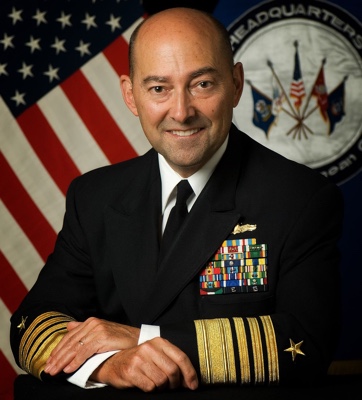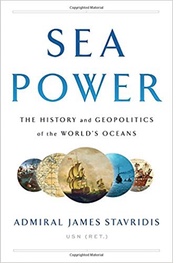What Does a United States Admiral Make of the World Today?

Admiral James Stavridis retired from the United States Navy in 2013 after more than thirty-five years of service. Admiral Stavridis had many leadership positions in the Navy, including Supreme Allied Commander for Global Operations at NATO (2009-22013), the first navy officer to hold the post. He is the author or coauthor of eight books on military issues and international relations. He is currently Dean of The Fletcher School of Law and Diplomacy at Tufts University in Massachusetts. Admiral Stavridis’s most recent book, Sea Power: The History and Geopolitics of the World’s Oceans, is an interesting and provocative work that explores his career in the US Navy, the importance of naval power in world history, and the issues that American strategists face today and will need to confront in the future.
 David L. O’Connor:
Sea Power: The History and Geopolitics
of the World’s Oceans combines
personal stories of your experiences at sea—from you midshipman
days at the United States Naval Academy to your role as an admiral in
the US Navy—and an analysis of historical and contemporary
geopolitical issues and the role that navies play in them. Why did
you take this approach instead of writing a straightforward memoir or
an academic monograph?
David L. O’Connor:
Sea Power: The History and Geopolitics
of the World’s Oceans combines
personal stories of your experiences at sea—from you midshipman
days at the United States Naval Academy to your role as an admiral in
the US Navy—and an analysis of historical and contemporary
geopolitical issues and the role that navies play in them. Why did
you take this approach instead of writing a straightforward memoir or
an academic monograph?
Admiral James Stavridis: I felt a blended book that combines history, personal experience at sea, and current geopolitics was fresh and would keep a wider variety of readers interested. Hopefully all three zones of the book succeed, and together the product is greater than the simple sum of the parts!
DO: Your book covers a lot of different historical periods in many different parts of the world. Why did you choose to divide the analysis into chapters dedicated to specific bodies of water, beginning with the Pacific, which you call the Mother of All Oceans?
JS: I wrestled with how to take on something as big as the world’s oceans, but realized quickly that for a Sailor like me – having spent over 11 years day-for-day on the deep ocean – each of the big seas was a unique universe. I tried to then tie it all together at the end of the book, in the same way the oceans are tied together. As I point out early in the book, the British say, “the sea is one,” but the full story of the oceans has to be divided in some sensible way to make it coherent before putting it all together in the conclusion.
DO: Before we get into more recent examples of maritime powers, which ancient civilizations do you consider the most successful at using naval power to enhance their security and influence?
JS: Certainly the ancient Greeks, and there is strong evidence that the Persians were quite adept at sea as well. They collided at the Battle of Salamis, and the Greeks won the encounter, which is an example of a seemingly small hinge upon which the big doors of history swing: if the Persians had won, the world we know would be vastly different I suspect.
DO: The Royal Navy gets a lot of attention in Sea Power. What did the British do right and in what ways did they come up short?
JS: They were right in their realization early on that given a small population, and island geography, and global interests they absolutely would depend on the “wooden walls” of the Royal Navy. They also instituted strong training programs, built a national culture of admiration for their Navy, and groomed leaders (like Lord Nelson) through mentoring programs. They were often too devoted to tradition and failed to innovate in a timely fashion (Churchill was famous for snorting at the hide-bound dependence on tradition by the Admiralty, saying in frustration: “Traditions of the Royal Navy? I’ll give you their traditions: Rum, buggery, and the lash”). Overall, the Royal Navy delivered a world to Great Britain in opening and defending the sea lanes of communication upon which over a fourth of the entire globe depended as part of the British Empire.
DO: In your estimation, what were some of the most important turning points in the development of the US Navy before World War II?
JS: Certainly the decision by the Continental Congress to fund, man, and equip the first six powerful frigates, led by USS CONSTITUTION. (See Ian Toll’s brilliant book, Six Frigates to learn this full story.) The Civil War led to enormous innovation and presaged the beginning of the steel Navy. The intellectual power of the ideas of Rear Admiral Alfred Thayer Mahan at the end of the 19th century energized the Fleet and led to the global deployment of the Great White Fleet. Our participation in convoy operations and anti-submarine warfare in the First World War helped enormously in the run up to the Second World War. Overall, the US Navy grew by fits and starts, but was capable of increasing its size and power rapidly when the nation desperately needed it to do so after Pearl Harbor.
DO: Which World War II admirals do you admire most? What do you consider their key accomplishments?
JS: I think Raymond Spruance, the so-called “Quiet Warrior,” was a masterful strategist and had the balanced, calm personality that I particularly admire in a leader. I am also deeply impressed with Chester Nimitz, who was a global thinker, a crafty political infighter, and an officer of incredible integrity. Finally, while a young Admiral in WWII, I love Arleigh Burke, who went on to be the greatest of our CNO’s after WWII.
DO: Please assess how effectively the US Navy has strengthened the post-war international order, specifically in the promotion of free trade?
JS: The US Navy’s crucial role has been to confront the Soviet Union’s highly capable global Fleet throughout the Cold War and to keep open Sea Lanes of Communication throughout the post WWII period. As we re-enter a period of great power competition (US, Russia, China, perhaps India over time) that role will come back to the fore – sea control. Throughout the same period, the US Navy has conducted highly effective power projection from Carriers, big-deck Amphibs, and Tomahawk missiles in crisis ranging from the Persian Gulf to the War in Afghanistan. We have also been the backbone of strategic nuclear deterrence with the Ballistic Missile Submarines, and tied it all together with a global logistics network that delivers strategic sealift for the nation.
DO: You shared your reflection on how environmental issues were completely absent from you studies at Annapolis and yet your book devotes a considerable amount of attention to them, especially climate change. What does the US Navy need to do to prepare for the possible challenges posed by climate change?
JS: Three crucial tasks are ahead. First we must operate the Fleet in the most ecologically sensitive and energy efficient way we can. This as been derided by some as “politically correct,” but the need for a Green Fleet is sensible, far-sighted, and achievable at relatively low cost. Second, we need to examine our global footprint with an eye toward rising sea levels and their impact on both US and international waterfronts and bases, ensuring we continue to have the ability to operate into the 22nd century and beyond regardless of environmental damage. Third and finally, we need to recognize that the Arctic ice is melting and we will end up operating in that harsh and unforgiving environment as new competition for the High North unfolds between Russia and the NATO nations that are part of that region. We will need new icebreakers, as well as hardening of our ships and aircraft.
DO: Your self-effacing sense of humor is on display throughout your work. Would you mind sharing a mishap with us? What was the lesson of the story?
JS: I’ve had so many ship handling mistakes and failures it is hard to pick one, but as a new ship captain in command of a brand-new Arleigh Burke destroyer, I brought the ship into Baltimore and let one of my youngest and least experienced officers do the driving. I failed to give sufficient oversight to her well-meaning efforts, and by the time I stepped in to try and sort it out, we managed to put a dent in the after quarter of the ship – in front of everyone on the waterfront. The overall lesson for anyone trying to drive a ship is that “the sign of a good ship handler is not getting into a situation requiring great ship handling skills” (Admiral Ernest King). It is a pretty good life lesson as well.
DO: You describe numerous challenges that the United States faces all over the world. Which do you consider the most pressing and how can the US Navy help meet them?
JS: Three come to mind: The resurgence of Russia, especially in operations at sea through their submarine force; the rise of China, which is building a highly capable blue water fleet; and the threat of terror at sea, perhaps an attack on a cruise liner a la 9/11. Certainly there will be near term tactical challenges from North Korea and Iran as well. There are plenty of others, but those will be crucial maritime challenges and the US Navy will be at the heart of meeting them.
DO: The ghost of Alfred Thayer Mahan pervades the book from the title on the front cover to the penultimate paragraph in the book. Which of Mahan’s ideas are still applicable today? How do we need to revise some of his prescriptions?
JS: The final chapter of the book is devoted to exactly this, and I’d simply refer the engaged reader to that – it is the heart of the message.